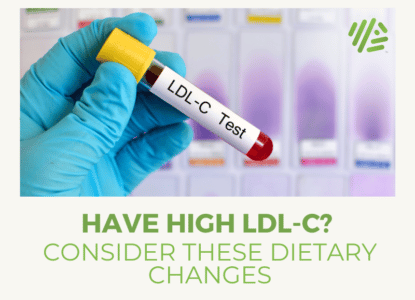5 Signs a Ketogenic Diet Isn’t Right For You

Contents
Heart disease is America’s number one killer, and perhaps like no other chronic illness, diet plays a major role in lifetime risk.
Although a heart attack may come on suddenly, heart disease is a death by a thousand cuts, smoldering for years, and often starting in childhood, so the lesson is clear: even diets you feel fantastic on short term can be harmful over the long term.
Not everyone is well suited to a ketogenic diet, for some of us, a high fat diet will increase the risk for heart disease. For example, American Heart Association has warned against including too much coconut oil in the diet because of the impact saturated fat can have on LDL levels.
In this post, we break down 5 signs a ketogenic diet might not be right for you.
Why is the ketogenic diet popular?
Under normal circumstances, the human body burns carbs and sugar as fuel. We break down the bread, rice, and oats we eat and convert it into glucose to power all of our activities. The brain loves glucose and so do babies in the womb. Glucose is the universal fuel source for all our cells. However, in today’s fast food, standard American diet world, many of us get too much glucose, and when we eat more glucose than the body can store or burn, we convert it into fat. Chronically elevated blood glucose drives inflammation and disease.
Enter the ketogenic diet.
The ketogenic diet is marketed as a one size fits all weight loss solution for western populations facing never before seen rates of obesity. Although recent studies from some of our top nutrition journals show nutrigenomic interventions are more effective tools for sustained weight loss than are ketogenic diets, many diet gurus continue to recommend “keto” en masse.
The reality of ketogenic diets is that results vary greatly between individuals. If you’ve reached this blog post, it’s likely because you’re trying keto but it’s not working.
Let’s dig into 5 warning signs that a ketogenic diet might not be a good solution for you.

Get Started With Personalized Nutrition
Gene Food uses a proprietary algorithm to divide people into one of twenty diet types based on genetics. We score for cholesterol and sterol hyperabsorption, MTHFR status, histamine clearance, carbohydrate tolerance, and more. Where do you fit?
#1. You can’t achieve ketosis
Lost in all the enthusiasm about low carb diets and weight loss, is the actual goal of a ketogenic diet, which is to produce elevated levels of ketones in the blood. Unless you have these circulating ketones working their magic, you are not in ketosis and there is no reason to follow a “ketogenic diet.” By contrast to our western state of constant grazing, in times of famine, the body will burn fat stores instead of sugar as a “backup fuel source.” A state of “ketosis” is achieved when the metabolic byproduct of burning fat for energy, called ketones, reach critical levels in the blood.
The late Dr. Veech at Harvard was one of the pioneers of ketone research. His life’s work focused on the protective effect of ketones. Dr. Veech was a talented scientist who published article after article on the benefits of ketones, and his work must be recognized and taken seriously.
However, it’s important to remember, that not everyone can achieve a state of ketosis, which is defined as a ketone blood millimolar count of between 0.6-3.0 mmol/L.
General guidelines for achieving ketosis, according to Diabetes UK, are as follows:
- Under 0.6 mmol/L – normal blood ketone level
- 6-1.5 mmol/L – higher ketone levels than usual
- 6-3.0 mmol/L – high ketone levels; very likely in ketosis, but poses a risk of ketoacidosis
- 00 mmol/L or higher – a dangerous level of ketones; requires immediate medical intervention.
Here is where the rubber meets the road and personalized nutrition enters the fray: not everyone can achieve nutritional ketosis genetically. Carriers of genetic variants in the PPARA genes often can’t achieve ketosis at all, no matter how much fat they eat.
Instead, when these individuals go on high saturated fat diets, they see large upticks in cardiovascular risk markers like triglycerides, small dense LDL, and total cholesterol. 1 2 Further, these people can’t get their millimolar counts to the threshold needed to achieve the protective effects of a ketogenic diet. For this population, a ketogenic diet, especially one with large amounts of saturated fats, is one of the unhealthiest diets they could follow, and one that almost certainly increases their risk for heart disease over time.
Step to take: routinely measure blood ketones to confirm you are in a state of ketosis. If you aren’t achieving a level of at least 0.6 mmol/L, it’s time to consider a different diet. It is also worthwhile to have genetic testing done to determine your PPARA status.
#2. Your cholesterol is sky high
If your cholesterol and heart health biomarkers, like APOB, go off the charts high on a ketogenic diet, it’s a sign the diet isn’t for you.
Last year, we were fortunate to have world renowned lipid expert, Dr. Tom Dayspring on the podcast. One of the reasons we wanted to have Dr. Dayspring on the podcast was to set the record straight on LDL and heart disease.
There are a number of low carb forums that encourage members to stay on low carb and ketogenic diets despite very high LDL-C and total cholesterol. This advice goes against medical consensus and could be dangerous for your health over the long term. If you’re on the fence, the European Atherosclerosis Society issued a position paper in 2020 detailing how and why LDL causes heart disease. If you’re still on the fence, I would encourage you to listen to this interview with Dr. Peter Attia and low carb advocate Dave Feldman. Listen to the entire episode and see if you can answer the question: where did Moffett get his cholesterol?
Of course, it’s important to emphasize that not everyone has the same reaction to a ketogenic diet. A study published in 2019 in the Journal Atherosclerosis is instructive. Called the Retterstol study, researchers in Norway took 33 healthy young adults and placed them on a high fat, ketogenic style diet. The scientists measured biomarkers for all participants and found that although the average increase in LDL-C was 44%, the range varied between 5% – 107%!
Diets high in saturated fat will increase LDL-C in almost everyone. the trick here is to determine what your biomarkers look like before and after going on a high fat diet. Maybe you’re one of the lucky ones who fall closer to the 5% increase some subjects in the Retterstol study experienced. However, if your doctor expresses concern about high cholesterol, it’s best to respect medical advice rather than assuming partisans on the internet have figured out something the Cleveland Clinic and Mayo Clinic missed. Both the Cleveland Clinic and the Mayo Clinic state unequivocally that elevated LDL is a major cause of heart disease, with this quote from the Cleveland Clinic website summing things up nicely:
The fact is, elevated low-density lipoprotein (LDL), the bad cholesterol, is a major cause of heart disease. LDL causes the build-up of fatty deposits within your arteries, reducing or blocking the flow of blood and oxygen your heart needs. This can lead to chest pain and heart attack.
Step to take: have an advanced lipid panel done with your physician, both before going on a ketogenic diet and after to see what your blood looks like on a high fat diet.
#3. Your digestion is a mess
This much we know for sure – the ketogenic diet will alter your gut microbiome. Will it do so favorably or unfavorably? That is up for debate.
Let’s look at a couple studies which showed conflicting results and see if we can garner some take away lessons.
Study showing favorable microbiome changes on keto
The first study, published at UC San Francisco showed positive results for the microbiomes of obese men on keto vs. the state of their microbiome on a standard American diet. Although this was a controlled feeding trial in a metabolic ward, it was also a very small sample size of just 17 individuals. The participants in the UC San Francisco study saw the greatest increase in certain Bifidobacterium species on the ketogenic diet – but here’s the rub: the microbiome benefits on a ketogenic diet were reliant on the subjects achieving a state of ketosis, as opposed to blindly following a high fat diet. Further, it’s not entirely surprising to me that switching from a standard American diet full of sugars, processed foods, and low quality meat to a diet that presumably included some avocado, butter, nuts and seeds and the like would make for a better microbiome. The thing to keep in mind with this study is what the favorable microbiome changes were measured against. That seems to be the key.
Study showing negative microbiome changes on keto
The next study I want to highlight saw the opposite result. This study was published in the Journal Gut which is an official journal of the British Society of Gastroenterology. In a study of 217 healthy participants aged 18-35 and placed on a ketogenic diet, researchers saw a major proliferation of “bad” gut bacteria on keto when compared to lower fat diets. The study was a randomized controlled feeding trial that lasted 6 months.
Some of the highlights:
- The high fat group saw lower levels of protective short chain fatty acids which line the gut wall and prevent leaky gut
- The high fat group saw greater levels of Alistipes bacteria, a genus associated with inflammation and gut problems
- The high fat group saw elevated levels of lipopolysaccharides, which are endotoxins that can damage the gut wall 3
The findings from the Journal Gut indicate that, at least for some people, ketogenic style diets will have a negative impact on the state of their microbiome. As a side note for interested readers, Gut produces a podcast which I just subscribed to and you may find of interest.
Step to take: Keep a food and mood journal and watch for trends on different diets.
#4. You are tired all the time
Keto forums are full of reports of severe fatigue, even after 6-8 weeks on high fat diets, which is a period of time that would rule out the “keto flu.” Consider these forum entries:
- Struggling with extreme fatigue and weakness after 15 days on keto
- 5 months on keto but getting more and more tired
- So tired on keto
- Exhausted after 2 months on keto
- Extreme fatigue on keto
While anecdotal stories can’t be relied on for scientific consensus, there are well designed studies which have identified fatigue and muscle weakness as common side effects of ketogenic diets. As it turns out, the anecdotal accounts of fatigue on keto are backed up by studies. For example, this study which appeared in the peer reviewed Journal Nutrients, looked at the athletic performance of 17 healthy women on a low carbohydrate ketogenic diet with no restrictions on calories. The women in the ketogenic diet group lost an average of 2 minutes from the time it took to cycle to fatigue and felt a greater level of exertion doing the same tasks as when on a diet that included more carbohydrates.
The bottom line is this: if you have tried a ketogenic diet and are tired all the time, you’re not alone. The study I cite above from the Journal Nutrients evaluated healthy young women on a keto diet.
Step to take: Keep a food and mood journal to spot trends on different diets.
#5. You can’t keep the weight off
Ketogenic diets are usually marketed as weight loss diets, but is keto truly the best way to lose weight?
New science from some of our best medical journals is teaching us that keto weight loss strategies are hard to maintain, and many amount to nothing more than a crash diet.
Everyone will lose weight when they starve themselves, but can they keep the weight off? That is the question.
A 2020 study from the peer reviewed Journal BMC Nutrition, which evaluated 114 people struggling with their weight, found that those placed on a ketogenic diet lost more weight in the first 24 weeks when compared to a DNA diet, however, over 18 months the DNA diet group had lost on average 19 more pounds than the keto group! The subjects placed on the personalized diet plan also saw much better improvement in cholesterol (including HDL-C) and blood sugar numbers.
The BMC study teaches us that, yes, DNA diets work, but also that one size fits all prescriptions for ketogenic diets don’t. The idea that we can simply say – “oh, yes, you are a human therefore you will benefit from a ketogenic diet” is simply false. In the context of weight loss, new science is teaching us that personalized nutrition is a far better weight loss intervention than is suggesting everyone go keto.
If your goal is weight loss and you continue to yo yo back and forth between different weights when on and off keto, it could be a sign that keto isn’t sustainable, that you are losing weight because of a severe calorie deficit, and that it might be time to try something else.
Step to take: Use an app like Cronometer to track calories. If you see a major caloric deficit, you are starving yourself and it’s a sign keto is nothing more than a crash diet.
Summary
There is ample evidence that ketogenic diets work for treating epilepsy and some evidence they can be an effective tool for weight loss, but at what cost?
If you’re thriving on keto, great, but if you are seeing lab results that make your physician nervous, are tired all the time, and have seen a downturn in your digestion, your body might be trying to tell you something.

Get Started With Personalized Nutrition
Gene Food uses a proprietary algorithm to divide people into one of twenty diet types based on genetics. We score for cholesterol and sterol hyperabsorption, MTHFR status, histamine clearance, carbohydrate tolerance, and more. Where do you fit?


